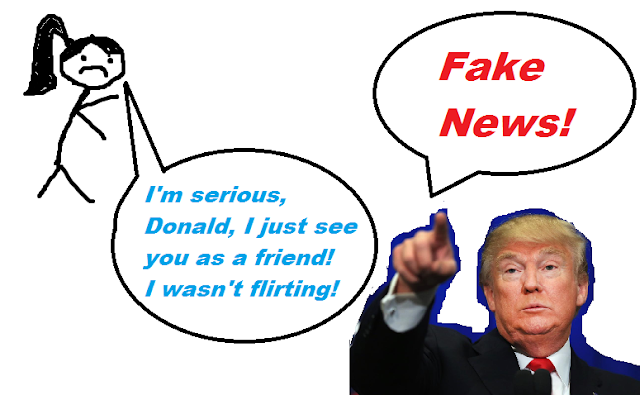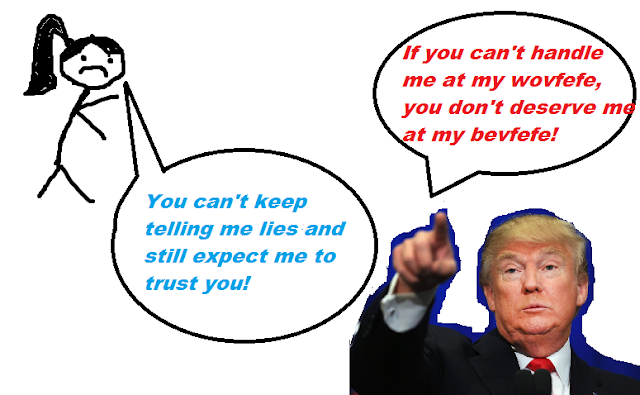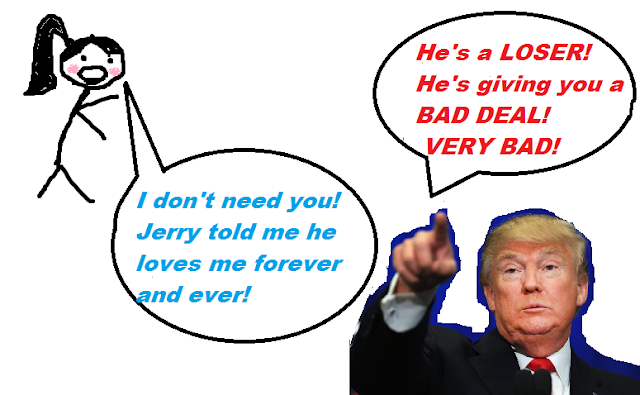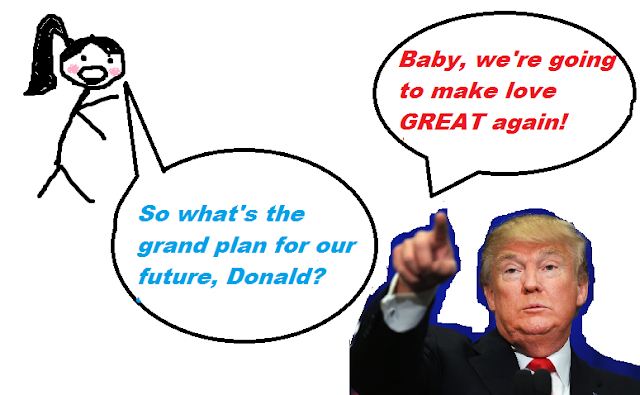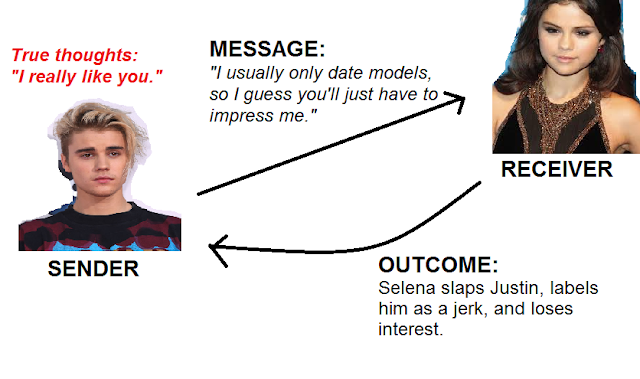A series where I attempt to explain basic economic principles through the dating scene. Rule #1: Don't take anything I say too seriously.
In the example above, an anonymous person estimates the total savings incurred from one month of dating a "funny guy." Since he/she already has non-stop entertainment in the form of a date, this has resulted in massive economic savings! Hence he/she views the characteristic of "funny" as valuable, despite its intangible nature.
Q: So I finally caved in to 21st century dating and installed a bunch of dating apps....but it's been thoroughly disappointing so far. Can you believe that the only matches I've been getting are cute girls who want to sell me health insurance?! What a scam of an app!
Well, actually, I can believe that. It seems that you've neglected to disclose your education, height, and job, as well as forgotten to include dashing photos of yourself carrying a ten pound baby while skydiving into the sweeping shoreline of South Africa. What a scam of a profile!
Q:
Excuse me? I refuse to be reduced to just a paper trail and a JPEG
image. I mean, I'm neither a rock star nor an investment banker, but I
certainly have my strengths--my charming personality and undying
loyalty!
O naïve child, it seems that you haven’t taken any of my advice to heart—as we’ve previously established, love is a delicate dance of risk and reward. Much like a middle-school-gym dance where self-doubt and inaction reign, and everyone ends up dancing in a big circle for fear of rejection, the dance of love is fraught with risk-averse acts committed by risk-averse players.
In these dire circumstances, perhaps it's helpful to consult some risk-averse experts of the game. Whenever I peruse the scintillating profiles of Tinder and other apps, I always ask myself this timeless question:
O naïve child, it seems that you haven’t taken any of my advice to heart—as we’ve previously established, love is a delicate dance of risk and reward. Much like a middle-school-gym dance where self-doubt and inaction reign, and everyone ends up dancing in a big circle for fear of rejection, the dance of love is fraught with risk-averse acts committed by risk-averse players.
In these dire circumstances, perhaps it's helpful to consult some risk-averse experts of the game. Whenever I peruse the scintillating profiles of Tinder and other apps, I always ask myself this timeless question:
You see, Warren Buffet is the poster child of risk-aversion and a lifelong advocate of quality investing. According to him, "it's far better to buy a wonderful company at a fair price than a fair company at a wonderful price." Market trends will come and go (dad-bods, lumbersexuals, tech billionaires...), and it's frighteningly easy to succumb to such trends with a swipe of the index finger, but Buffet urges us to be disciplined, do our research, and invest in fundamentally sound assets that will grow and succeed in the long term. For those of us who dread heartbreak and loss, Buffet's investment philosophy allows us to still enter the dating arena (one must still take risks after all when opportunity strikes), but with relatively more margin of safety and peace of mind.
Here are some questions that Warren Buffet and other long-term investors ask late at night.
Hm, sounds like many of us after a tentative first date.
(Note: I do not view "earnings" here as strictly financial, but as the total utility that the investment brings to the investor)
Q: But I'm totally a great long-term investment! That just proves my point!
Well, let's dive slightly deeper and analyze what investors consider as "quality companies." Here is a very simplified matrix (developed by consultants, adapted by yours truly) that divides all potential partners into four major categories:
Investors have developed various ways to assess the fundamental value, growth potential, and well-being of a company. Most of them are based on the firm's projected future earnings and/or cash flow, because at the end of the day, if a company is healthy and growing, it should be able to generate long-term earnings and cash that can be returned to investors. Furthermore, tangible assets and outcomes are easier to quantify and compare, and allow some margin of safety--ie: in the worst case scenario, I can still sell all the firm's expensive machines and get some cash!
This focus on tangible, quantifiable returns was seen in marriage markets of the olden days as well, when marriage was effectively a political and financial transaction. Many old patriarchs have thought long and hard about these questions:
Hence the emphasis on the following "tangible assets" when selecting a partner:
Q: Are you saying I need to list out my degrees and achievements not to appease materialistic suitors, but to help risk-averse "investors" make a "sound investment decision?"
Yes. You are reducing noise and feedback by stating actual truths. After all, materialism is borne out of uncertainty and anxiety about one's existence and future, so you're essentially making the world a more meaningful and hospitable place by disclosing something real, something that minimizes stress and regret and uninformed decisions.
Q: Okay...but I think you're forgetting something important here. What about love? What about chemistry?
Oh, right....feelings. This is something that risk-averse daters struggle with on a daily basis. Can you value a future with someone based on warm and fuzzy feelings? Can you forecast potential utility based on amazing conversations that go on from night to day? Can you quantify someone's radiant, beautiful smile and the feeling of home that emanates from the depths of your soul when such a smile is beamed your way?
Investors are still figuring out the solution to this. They call these intangible assets: non-physical assets that still generate some measurable economic benefits to the owner. (ex: intellectual property, brand recognition, etc.)
Good feelings can be regarded as intangible assets since they bring benefits to the owner. In fact, intangible feelings can be a better indicator of growth potential than tangible assets, much like how a company's patents and brand power can affect its future earnings and economic benefits. However, neglecting to properly value these feelings can lead to underestimating or overestimating the risk and return of a potential dating partner.
Here are some possible ways we can value intangibles, based on current accounting methods:
Here are some questions that Warren Buffet and other long-term investors ask late at night.
Hm, sounds like many of us after a tentative first date.
(Note: I do not view "earnings" here as strictly financial, but as the total utility that the investment brings to the investor)
Q: But I'm totally a great long-term investment! That just proves my point!
Well, let's dive slightly deeper and analyze what investors consider as "quality companies." Here is a very simplified matrix (developed by consultants, adapted by yours truly) that divides all potential partners into four major categories:
The Growth-Returns Matrix for Potential Baes
- Star: High returns, high growth potential
- Everyone hopes to meet a star--someone who brings you bliss and magical moments, but who also has the potential to grow with you over the long term. A date worthy of your time and effort if you are lucky enough to meet him/her.
- Cash Cow: High returns, low growth potential
- In the business world, a cash cow is an investment in a mature, slow-growth industry that brings steady returns. In the dating world, treating someone as a literal "cash cow" is definitely not recommended due to human rights/dignity and all. "Cash cow" here means a date that is already mature, stable, and reliable, yet is still a good match that you could potentially love.
- Question Mark: Low returns, high growth potential
- Sometimes, you meet mysterious people that could turn out to be either the love or the disaster of your life. A high risk investment, but because of the high potential returns, it's worth taking the time to collect more information to determine whether to invest more in this date.
- Dog: Low returns, low growth potential
- What are you even doing with your time? Life is short. Avoid unnecessary heartbreak. Move on immediately.
How can we accurately determine "growth potential" and "returns"?
This focus on tangible, quantifiable returns was seen in marriage markets of the olden days as well, when marriage was effectively a political and financial transaction. Many old patriarchs have thought long and hard about these questions:
- If my son marries this lady, will we be more equipped to survive the harsh winters to come?
- Will I be able to acquire more land and cattle and finally build a new wing to my house?
- Will I have healthy descendants to take over our family's farming business?
- In the worse case scenario that all my descendants die in the winter, can I still sell the marriage dowry?
Hence the emphasis on the following "tangible assets" when selecting a partner:
- Wealth
- Land/properties owned
- Family/political reputation, connections, and titles
- Family health history
- Religious beliefs
- Skills and professional qualifications
- Specific physical attributes that one hopes to see reproduced in one's offspring
In our modern era, dating is more an exercise of "free will," but ironically, amid the deluge of choices and noises, we are now searching harder than ever for what is "real" and "valuable." For example:
- He's texting me a lot, but will he ask me out on a date?
- He's looking good in this picture, but how do I know he's not a 13 year old boy trolling the Internetz?
And this is where your Tinder profile comes in! Assuming you are
advertising to risk-averse dates, it's absolutely necessary to
include tangible facts that your audience can easily understand and
evaluate, as opposed to vague pick-up lines that attempt to
portray your "charming personality," but in effect raises your perceived risk.
It's important to differentiate between perceived risk and actual risk here--while in reality you might be the most stable and dependable cuddly bear worthy of long-term companionship, your failure to include signifiers of "stability" and "maturity" leads to an increase in your perceived risk level. Tangible, verifiable signifiers can thus help to narrow the gap between perceived and actual risk.
It's important to differentiate between perceived risk and actual risk here--while in reality you might be the most stable and dependable cuddly bear worthy of long-term companionship, your failure to include signifiers of "stability" and "maturity" leads to an increase in your perceived risk level. Tangible, verifiable signifiers can thus help to narrow the gap between perceived and actual risk.
Q: Are you saying I need to list out my degrees and achievements not to appease materialistic suitors, but to help risk-averse "investors" make a "sound investment decision?"
Yes. You are reducing noise and feedback by stating actual truths. After all, materialism is borne out of uncertainty and anxiety about one's existence and future, so you're essentially making the world a more meaningful and hospitable place by disclosing something real, something that minimizes stress and regret and uninformed decisions.
Q: Okay...but I think you're forgetting something important here. What about love? What about chemistry?
Oh, right....feelings. This is something that risk-averse daters struggle with on a daily basis. Can you value a future with someone based on warm and fuzzy feelings? Can you forecast potential utility based on amazing conversations that go on from night to day? Can you quantify someone's radiant, beautiful smile and the feeling of home that emanates from the depths of your soul when such a smile is beamed your way?
Investors are still figuring out the solution to this. They call these intangible assets: non-physical assets that still generate some measurable economic benefits to the owner. (ex: intellectual property, brand recognition, etc.)
Good feelings can be regarded as intangible assets since they bring benefits to the owner. In fact, intangible feelings can be a better indicator of growth potential than tangible assets, much like how a company's patents and brand power can affect its future earnings and economic benefits. However, neglecting to properly value these feelings can lead to underestimating or overestimating the risk and return of a potential dating partner.
Here are some possible ways we can value intangibles, based on current accounting methods:
- Savings incurred
In the example above, an anonymous person estimates the total savings incurred from one month of dating a "funny guy." Since he/she already has non-stop entertainment in the form of a date, this has resulted in massive economic savings! Hence he/she views the characteristic of "funny" as valuable, despite its intangible nature.
- Replacement costs
The replacement costs approach is similar to the savings approach, but from a different perspective. It asks, how much would the nearest equivalent cost? Compared to the savings approach, which only accounts for direct
savings, this includes indirect costs such as research and development:
Q: Oh, that's great! So based on these intangibles valuation approaches, I'm not totally worthless after all!
I didn't mean to confuse you, dear hunter of love--someone will still appreciate your worth! From our discussion today, it should be pretty clear that both tangible and intangible assets are evaluated among daters today. However, tangible assets are much easier to understand, which is why you should always seek to provide as much clear information as possible. Additionally, intangible assets such as "passion" and "charm" are often inaccurately valued, which is why we need to continue to educate ourselves and others and think hard about what we value in our life and our relationships!
I've given you more than enough ramblings to think about today. Go forth and revise your Tinder profile once more!
I didn't mean to confuse you, dear hunter of love--someone will still appreciate your worth! From our discussion today, it should be pretty clear that both tangible and intangible assets are evaluated among daters today. However, tangible assets are much easier to understand, which is why you should always seek to provide as much clear information as possible. Additionally, intangible assets such as "passion" and "charm" are often inaccurately valued, which is why we need to continue to educate ourselves and others and think hard about what we value in our life and our relationships!
I've given you more than enough ramblings to think about today. Go forth and revise your Tinder profile once more!








